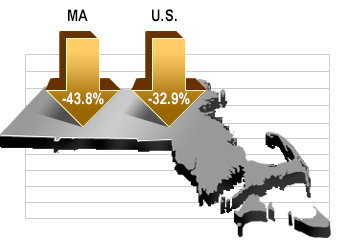Q2 2020 was the worst quarter on record, UMass journal reports
Massive job losses & substantial declines in income & spending reflect the pandemic response
July 2020
» Download the detailed report
 In the second quarter of 2020, based on the best information available today, Massachusetts real gross domestic product (GDP) declined at an annualized rate of 43.8 percent according to MassBenchmarks, while U.S. real gross domestic product declined by 32.9 percent during the same period according to the U.S. Bureau of Economic Analysis (BEA). In the first quarter of 2020, the BEA estimates that the Massachusetts and U.S. economies declined by 5.1 percent and 5.0 percent respectively on an annualized basis.
In the second quarter of 2020, based on the best information available today, Massachusetts real gross domestic product (GDP) declined at an annualized rate of 43.8 percent according to MassBenchmarks, while U.S. real gross domestic product declined by 32.9 percent during the same period according to the U.S. Bureau of Economic Analysis (BEA). In the first quarter of 2020, the BEA estimates that the Massachusetts and U.S. economies declined by 5.1 percent and 5.0 percent respectively on an annualized basis.
These historic second quarter declines reflect the impact of COVID-19 shutdowns of economic activity, particularly in leisure and hospitality, personal services, construction, retail and wholesale trade, healthcare, education, and manufacturing. This was the steepest quarterly decline in economic activity for both the state and the nation on record. As the economy began to slowly reopen in April, growth reversed course sharply in a positive direction, so the second quarter results reflect both the sharp drop from the peak in February and the climb from a very deep trough in April.
Massachusetts, along with several other states in the Northeast, was hit harder by COVID-19 before the country as a whole, was shut down earlier and more completely than most other states and began to reopen later and more slowly than most states. This makes it unsurprising that the pace of the economic decline in Massachusetts was greater than it was nationally in the second quarter of 2020.
In the second quarter, payroll employment fell by 16.5 percent in Massachusetts as compared to 12.0 percent nationally. These represent annualized rates of decline of 51.4 percent in Massachusetts and 40.0 percent in the U.S. In the first quarter of this year, employment in Massachusetts fell 0.1 percent as compared to growth of 0.4 percent nation-wide, on an annualized basis. Relative to the second quarter of last year, employment in Massachusetts is down 16.3 percent and 11.2 percent nationally.
MassBenchmarks estimates wage and salary income in Massachusetts fell 11.2 percent in Massachusetts and declined by 7.1 percent nationally in the second quarter, representing annualized rates of decline of 37.7 percent and 25.4 percent respectively. In the first quarter, according the BEA, wage and salary income rose 0.5 percent in Massachusetts on an annualized basis and was flat (0.0 percent growth) for the U.S. as a whole. Year-over-year, wage and salary income fell 10.3 percent in Massachusetts and 5.6 percent for the U.S. during the second quarter.
Unemployment rates rose faster and remain higher in Massachusetts than for the U.S. From March to June, the unemployment rate rose from 2.8 percent to 17.4 percent in Massachusetts, and from 4.4 percent to 11.1 percent nationally. Based on the Bureau of Labor Statistics (BLS) Current Population Survey, MassBenchmarks estimates that the U-6 unemployment rate–which includes persons working part-time but who want full-time work and persons who want work but have not looked for work in the last four weeks–rose from 7.9 percent in March to 21.2 percent in June. The BLS reports that the national U-6 rate rose from 8.7 percent in March to 18.0 percent in June.
The fall in employment and earnings in addition to the widespread economic shutdowns significantly decreased spending in the state during the second quarter. MassBenchmarks estimates that spending on items subject to the Massachusetts regular sales and motor vehicle sales taxes fell 11.1 percent in the second quarter, an annualized rate of decline of 37.5 percent. In the first quarter, such spending rose 4.4 percent on an annualized basis. Spending declined by an estimated 7.5 percent on a year-over-year basis in the second quarter.
"As the economy continues to reopen, third quarter growth should be sharply higher", noted Alan Clayton-Matthews, MassBenchmarks Senior Contributing Editor and Professor Emeritus of Economics and Public Policy at Northeastern University, who compiles and analyzes the Current and Leading Indexes. "Given that Massachusetts started opening up later than most other states and is having success limiting the spread of COVID-19 thus far, there is the very real possibility that state performance in the third quarter will outpace that of the nation," Clayton-Matthews added. Nevertheless, employment and economic activity are not expected to return to their peak levels (February) anytime soon.
State economic indicators for May and June are markedly more encouraging than they were in March and April. After losing 690,500 jobs in March and April, an estimated 138,700 were added in May and June. Initial unemployment claims have fallen steadily from 409,000 in March to 144,000 in June. The U-6 unemployment rate fell from 26.4 percent in April to 21.2 percent in June, suggesting more part-time workers are finding full-time work. Spending on items subject to the Massachusetts regular sales and motor vehicle sales taxes also began to rise sharply in May.
The outlook for the fourth quarter is considerably more uncertain. For Massachusetts as well as the nation, the pace of the recovery and length of time the economy is operating below capacity will depend on the course of COVID-19, the efficacy of public health policies designed to prevent its spread, the cooperation of the public and their adherence to public health guidelines, and success in finding and distributing safe vaccine(s) and effective treatments for the virus.

